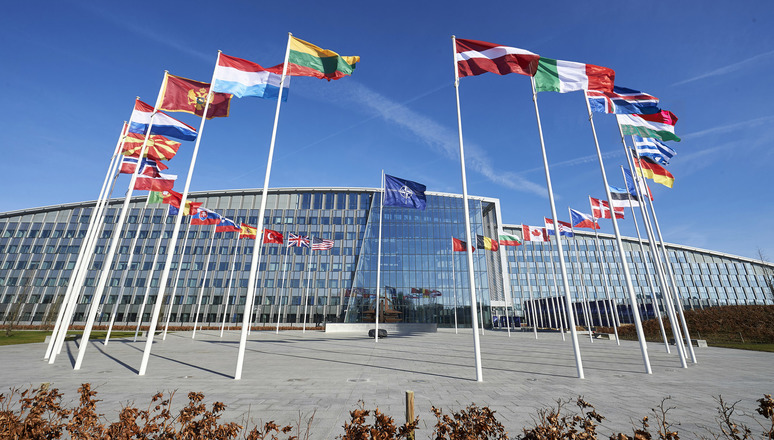Foreign Affairs ran a poll on the question. A few of us expressed skepticism about the debate itself.


Foreign Affairs ran a poll on the question. A few of us expressed skepticism about the debate itself.
For the first year of the Trump Administration, the Washington D.C.- based denizens of the U.S. foreign policy establishment assured themselves that although Donald Trump had tipped over the...
I tend to complain a lot about the NATO 2% expectation--that members are supposed to spend 2% of their GDP on defense stuff, which probably makes more more Canadian than anything else I do (I don't...
In the aftermath of Trump's visit to Brussels one dynamic has been overlooked. It starts with a basic reality of NATO: when there is a mission, countries are not obligated to hand over military...
If only present day global competition were confined to the World Cup. But while eyes have turned back to a new crisis in Iraq—something I’m not exactly proud of predicting here—at least there has been progress on the Ukraine crisis, which has gone from boil to simmer in recent weeks. At this stage it has become clear that Russia has blinked, and thus will not be swallowing eastern Ukraine whole. Just as important, we now have clear as day evidence that President Putin’s gambit has failed: Ukraine has not only signed the EU trade agreement that former President Yanukovych walked away...
Editor's note: this is a guest post by Anna O. Pechenkina, Post-Doctoral Fellow, Dept of Social and Decision Sciences, Carnegie Mellon University. It is primarily a response to an essay Branislav Slantchev recently posted on his personal website. Branislav Slantchev advocates for NATO troops to be stationed in Eastern Ukraine to preserve western strategic interests in the region. The logic is that if NATO troops establish a "tripwire" in Ukraine, Russia will face a choice of whether to attack western troops and will (most likely) back down. While this describes the world in which I...
The U.S. and Russia are not engaged in a new Cold War, but Russia is clearly playing the geopolitical menace du jour. The U.S. and Europe are going to need to up their game to keep Vladimir Putin’s hands off the rest of Ukraine. Beyond this crisis the West needs a new defense posture, as the world just entered a new era of international relations. Just weeks ago numerous observers dubbed the opening of the Winter Olympics in Sochi “Putin’s Triumph,” when it was anything but that. Russia may have barely edged the U.S. in total medals, but the price for Putin’s orderly Olympics was...
If there is an Obama Doctrine in the realm of foreign affairs, it comprises robust multilateralism—being multilateral when the U.S. can, unilateral when it must. Subjected to scrutiny, however, the Obama Doctrine can only work if the U.S. has capable and willing partners. Yet under conditions of widespread fiscal austerity among western allies—and the political austerity of skeptical western citizens—meeting the challenge of securing their joint interests is formidable. While the U.S. has begun to shore up the security of its allies in Southeast Asia via its rebalance to Asia, despite...
A full-scale US military intervention in Syria is off the table, as is a no-fly zone. The US decision to provide arms to Syrian opposition forces is nonetheless intended to shift the military initiative away from Assad regime. But the opposition is splintered, which has allowed the Hezbollah-backed government forces to level the playing field. Although the outcome remains unclear, it may be time for Western governments to begin serious planning for potential post-conflict stabilization operations. At this stage it appears the Assad regime has the momentum, aided in particular by Hezbollah...
This is a guest post by Sean Kay. Professor Kay is chair of the International Studies program and professor of politics at Ohio Wesleyan University. He is also Mershon Associate at the Mershon Center for International Security Studies at The Ohio State University. He has written extensively on NATO and Europe, with his most recent book, Global Security in the Twenty-first Century: The Quest for Power and the Search for Peace (2011). In a recent Washington Post editorial, David Ignatius reported on a “big idea” that could “revitalize the U.S-European partnership for the 21st century.” The...
Moscow is once again expressing displeasure with US and NATO missile defense plans.Russia says it is prepared to use "destructive force pre-emptively" if the US goes ahead with controversial plans for a missile defence system based in Central Europe. The warning came after the Russian defence minister said talks on missile defence were nearing a dead end. Moscow fears that missile interceptors would be a threat to Russia's security.But the US and Nato say they are intended to protect against attacks from Iran or North Korea. "A decision to use destructive force pre-emptively will be taken if...
The chasm between Pakistani and Western reactions to last week's NATO attack on Pakistani forces seems to be growing if official actions/statements, media reports, conversations with friends on all sides, and ad hominem twitter flame wars are any indication.It goes without saying that Pakistanis are still in mourning for the death of their soldiers in what is a major national tragedy for a country that has had many national tragedies in recent years. But there is more going on than the understandable hurt and anger that follows a tragic friendly fire incident. This incident appears to be...